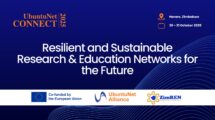This article was originally posted on the UbuntuNet Alliance’s website.

To encourage inclusivity among the NRENs, the Alliance has embarked on the road to encourage collaboration in the community through a process referred to as “NREN twinning”. Through this initiative, the Alliance seeks to promote well-being for all by ensuring that there is strong integration and collaboration among the NRENs irrespective of their maturity levels. According to a feasibility study on the Interconnection of Southern and Eastern Research Networks to GÉANT (2009), there is need for capacity building for African NRENs. The study further recommends the need to have twinning between African and European NRENs. The twinning concept, therefore, will involve matching the NRENs in terms of their needs to ensure homogeneity in the community. Once this is done, the NRENs will be encouraged to interact in a guided manner which will involve staff exchange programs, training and advocacy among others. Though carried out over thirteen years ago, its findings still find relevance today.
NREN twinning has many benefits that the Alliance is keen to promote. Through this initiative, NRENs will strengthen the extent to which they work together, collaborate, learn from one another and share experiences. As the demand for open science and digitization of education and research gain traction to become a pan-African necessity, the NREN twinning moment is now.
The current effort shall build on work carried out years ago, between Africa and European NRENs albeit on small scale. For example, in November 2009, the Kenya Education Network (KENET) and the German Research Network (DFN) signed an memorandum of understanding in Kampala to encourage capacity building which saw the two NRENs carry out staff exchange programmes. Similarly, the Mozambique Research and Education Network (MoRENet) and the Brazilian NREN (RNP) had a twinning arrangement which resulted in capacity building leading to adoption of cafMoz Federation and Eduroam services. The two NRENs further encouraged collaboration and visits between themselves. The Alliance, therefore, shall be working to forge twinning arrangements between its more established member NRENs with those that are up and coming.





